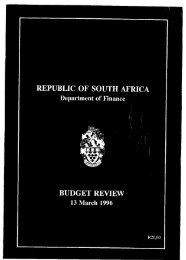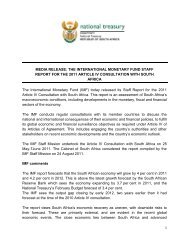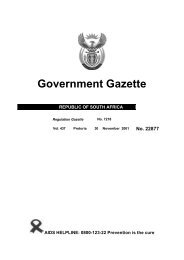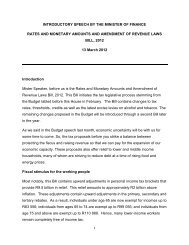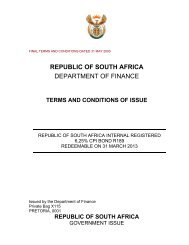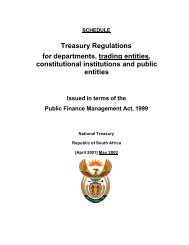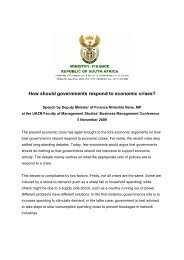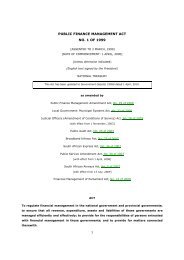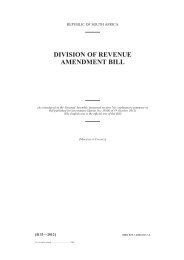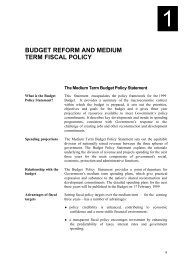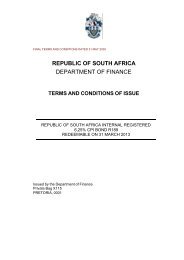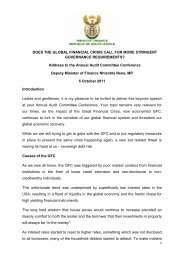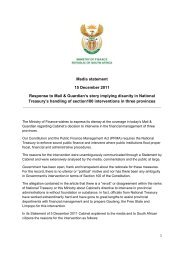1998 SOUTHERN AFRICA ECONOMIC ... - National Treasury
1998 SOUTHERN AFRICA ECONOMIC ... - National Treasury
1998 SOUTHERN AFRICA ECONOMIC ... - National Treasury
Create successful ePaper yourself
Turn your PDF publications into a flip-book with our unique Google optimized e-Paper software.
M a l awi Stock Exchange<br />
The stock exchange was established in 1994. T h e re is one<br />
s t o c k b roking company, S t o c k b ro kers Malawi Limited, w h i c h<br />
deals in listed company shares and acts as a bro ker in<br />
government and other securities. The Malawi Stock Marke t<br />
contracted a regional subsidiary of a UK investment bank to<br />
assist with the setting up of the marke t . The same company has<br />
also assisted with the establishments of the exchanges in<br />
B o t swana and Namibia. After a thre e - year ap p rentice period,<br />
c o n t rol of the stock exchange is now being passed over to an<br />
all Malawian staff. Due to its moderate size the exchange does<br />
not yet operate a central depository system and the settlement<br />
time is curre n t ly T + 7 .<br />
M A L AW I<br />
C e rtain current invisible pay m e n t s , such as private trave l ,<br />
business travel and medical expenses, a re subject to indicative<br />
l i m i t s . Holders of temporary employment permits are<br />
permitted remittances of up to two - t h i rds of their earnings.<br />
Residents are permitted to hold fo reign currency accounts, a n d<br />
e x p o rters may retain 40 percent of their fo reign exchange<br />
e x p o rt earnings in such accounts.The other 60 percent must be<br />
sold to an authorised dealer bank on re c e i p t .<br />
Fo reign Tr a d e<br />
M a l aw i ’s fo reign trade balance is, to a large extent, governed by<br />
p roduction levels and world market prices for tobacco, tea and<br />
M a l awi Stock Exchange (USDm)<br />
Ye a r 1996 1997<br />
Number of companies listed 1 3<br />
M a r ket capitalisation 1 4 . 7 1 0 9 . 9<br />
Volume of shares traded 2 5 8 , 6 0 0 3 , 0 2 5 , 9 5 8<br />
Value of shares traded (USD) 3 7 , 3 9 0 5 3 0 , 4 4 0<br />
Number of trading day s , 4 0 2 6 0<br />
M a l awi all share index 112.5 1 3 7 . 6<br />
Average dividend yield (annual ave r a g e ) 4 .0 8 . 8<br />
Average price-earnings ratio of all listed companies 11 . 18 6 . 36<br />
S o u rc e : M a l awi Stock Exchange. ( <strong>1998</strong> )<br />
The first company listed on the Malawi Stock Exchange was the<br />
<strong>National</strong> Insurance Company in November 1996. A second<br />
c o m p a ny, B l a n t y re Hotels Limited, was listed in March 1997,<br />
fo l l owed by Sucoma sugar company, majority owned by South<br />
A f r i c a ’s Illovo, in November 1997. The last listing boosted the<br />
m a r ket capitalisation from USD12.5 m to USD 110m.<br />
Trading activity started on a slow note in 1996 and early 1997,<br />
but picked up later in the year when SUCOMA listed. T h e<br />
M a l awi all share index has risen form 112.5 in November 1996<br />
to 154.6 in March <strong>1998</strong>. A major highlight of the exchange<br />
o c c u rred in early April <strong>1998</strong> when SUCOMA successfully placed<br />
51.9m shares on UK and South African markets thro u g h<br />
S t o c k b ro kers Malawi in a deal amounting to USD7.3m.<br />
T h e re are good prospects for further listings with the<br />
implementation of the privatisation pro g r a m m e. T h ree potential<br />
listings of the Press Corporation Ltd, the country ’s largest<br />
conglomerate with businesses ranging from supermarke t s , t o<br />
clothing manu f a c t u rers and tea and tobacco estates, a re in the<br />
p i p e - l i n e, as well as one of the leading banks, the Commerc i a l<br />
Bank of Malaw i , and Packaging Industries Malawi Ltd. T h e s e<br />
listings are expected to take place in June-August <strong>1998</strong>.<br />
E x c h a n ge Contro l s<br />
I nvestors may repatriate pro f i t s , d i v i d e n d s ,i nvestment cap i t a l<br />
and intere s t , and make principal payments for international<br />
l o a n s . I nvestors also have free access to fo reign exchange in<br />
M a l aw i , both for imports payments and transfe rring financial<br />
p ayments abro a d . H oweve r, c apital account controls still exist.<br />
Both inward and outward direct and port folio inve s t m e n t s<br />
re q u i re prior ap p rov a l .<br />
s u g a r. These three commodities account for around 85 perc e n t<br />
of domestic export s , with tobacco being by far the largest<br />
e x p o rt commodity. I m p o rts are dominated by capital goods and<br />
industrial equipment. During years of dro u g h t , M a l aw i ’s fo o d<br />
i m p o rts rise significantly. In recent years the direction of<br />
M a l aw i ’s fo reign trade has diversified with South Africa emerging<br />
as a major trading part n e r. M a l awi exports chiefly to<br />
industrialised countries (55 percent of total export s ), m a i n<br />
trading partners being the US, South A f r i c a ,G e r m a ny and the<br />
N e t h e r l a n d s . I m p o rts are sourced mainly in the deve l o p i n g<br />
world (74.4 perc e n t ), w h e re South Africa and Zimbabwe<br />
re p resent main sources (more than 50 percent of total import s )<br />
and the UK and Asian countries being other major sources of<br />
i m p o rt .<br />
Trade Liberalisation and Trade A g re e m e n t s<br />
M a l aw i ’s tariff re form programme is designed to bring Malawi in<br />
line with other southern African countries.Almost all non-tariff<br />
b a rriers have been re m ove d , and import licenses have been<br />
a b o l i s h e d , except for a small range of goods which have<br />
implications on health, s a fe t y, national security and the<br />
e nv i ro n m e n t . E x p o rt licenses have also been abolished for all<br />
goods excluding maize, g ro u n d nuts and beans. In March <strong>1998</strong><br />
the taxes on sugar, c o f fee and tea exports we re re d u c e d .<br />
M a l awi has signed trade agreements with some countries and<br />
has pre fe rential access to a number of marke t s :<br />
* The European Union: M a l awi is a signatory to the Lomé<br />
C o nve n t i o n ,ensuring that agricultural products and virt u a l ly all<br />
m a nu f a c t u red goods have pre fe rential access to all EU marke t s .<br />
41



